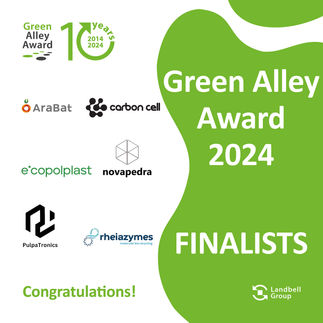Cutting-edge technology for everyone
European innovation platform offers companies access to resource-saving production methods
Over the past four years, Kaiserslautern University of Applied Sciences has worked with 25 partners from seven countries on cutting-edge technological solutions for the production of bio-based polyurethanes (PUR). sustainability was a central pillar of the BIOMAT project. The bio-based PUR foams and natural fiber-reinforced biocomposites developed as part of the project are based on natural raw materials. They are intended to significantly reduce the use of fossil materials. Thanks to nanotechnology, these materials also have superior thermal and mechanical properties as well as increased fire resistance and improved water resistance and achieve top properties with a significant proportion of renewable raw materials.
The European project offers companies access to technologies and services via an innovation platform. Several technologies enable the production of bio-based foams and composites enriched with nanomaterials. BIOMAT is thus boosting the European green economy.
The project results have already confirmed the innovative potential for industrial applications of these processes and materials. In the BIOMAT project, these new materials have been successfully tested by end users. Target markets are the construction industry (building and structural insulation), the automotive industry (vehicle interiors) and the furniture and upholstery industry (mattresses and sofas).
Prof. Dr.-Ing. Luisa Medina, Prof. Dr. Gregor Grun and Prof. PhD Sergiy Grishchuk are also researching this in the Pirmasens Department of Applied Logistics and Polymer Sciences at Kaiserslautern University of Applied Sciences. The group of researchers from Pirmasens is working on the question of how polymer materials can be made more sustainable in order to reduce their impact on the environment, e.g. their CO2 footprint. The Pirmasens researchers have succeeded in using high proportions of renewable raw materials in both the polyurethane material class and in textile reinforcement materials for biocomposites, while at the same time improving the material properties using nanofillers.
These materials are omnipresent in our daily lives. Polyurethanes are used, for example, in wear-resistant surfaces in cars, in high-performance adhesives or in foams for mattresses. The aim of the research is to use the highest possible proportion of renewable raw materials and at the same time improve the material properties using nanofillers.
Interested industrial companies can access BIOMAT results via an online platform (https://www.biomat-testbed.eu/). Fair and competitive prices allow technology transfer and the use of helpful services. Related services include life cycle assessment (LCA) and life cycle cost (LCC) studies, fundraising training, evaluation of materials for nanosafety and nanotoxicity and others.
Note: This article has been translated using a computer system without human intervention. LUMITOS offers these automatic translations to present a wider range of current news. Since this article has been translated with automatic translation, it is possible that it contains errors in vocabulary, syntax or grammar. The original article in German can be found here.
Topics
Organizations
Other news from the department science

Get the chemical industry in your inbox
By submitting this form you agree that LUMITOS AG will send you the newsletter(s) selected above by email. Your data will not be passed on to third parties. Your data will be stored and processed in accordance with our data protection regulations. LUMITOS may contact you by email for the purpose of advertising or market and opinion surveys. You can revoke your consent at any time without giving reasons to LUMITOS AG, Ernst-Augustin-Str. 2, 12489 Berlin, Germany or by e-mail at revoke@lumitos.com with effect for the future. In addition, each email contains a link to unsubscribe from the corresponding newsletter.





























































